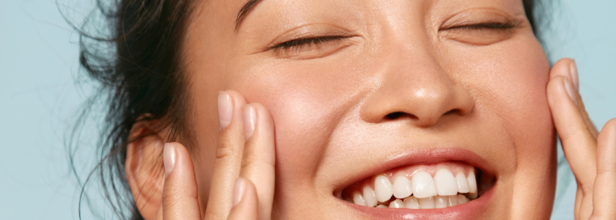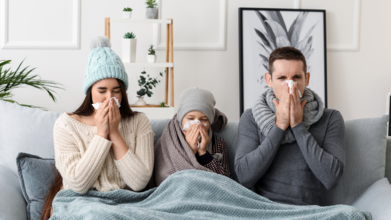- Health Conditions A-Z
- Health & Wellness
- Nutrition
- Fitness
- Health News
- Ayurveda
- Videos
- Medicine A-Z
- Parenting
- Web Stories
What Are Skin Probiotics? Do They Really Work?

Credits: Canva
Beneath the surface of our skin is a thriving ecosystem of bacteria, fungi, and other microorganisms. This microbiome plays an important role that keeps our skin youthful, resilient, and protects us from harmful pathogens. Studies also show that a well-balanced microbiome can promote wound healing, defend against infections, and even counteract the damaging effects of UV rays.
There has been a growing awareness of the skin microbiome and so many skincare companies are now introducing 'probiotics' for skin.
How Effective Are These?
The idea of using bacteria to improve skin health is not new. It has been there from as early as 1992, when scientists experimented with applying bacteria to treat acne and seborrhea, which is a skin condition that causes itching and flaking. The skincare industry today offers a wide range of probiotic-infused products, from cleansers and serums to moisturizers. All of them promise to rebalance the skin microbiome.
However, a closer look also reveals that many of these products do not actually contain live bacteria. Instead they rely on prebiotics, which are the nutrients that encourage the growth of beneficial bacteria, or postbiotics, which are the byproducts of bacteria that may benefit the skin.
The Challenge of Keeping Bacteria Alive
Why don’t most skincare products contain live probiotics? The answer lies in the difficulty of keeping bacteria alive throughout the manufacturing and storage process. Even if live bacteria make it into a product, there’s no guarantee they will survive long enough to take effect on the skin, where they must compete with millions of existing microbes.
Can Live Bacteria Treat Skin Conditions?
Despite the challenges, some researchers are testing whether live bacteria can treat specific skin conditions like eczema and acne. One promising approach focuses on the relationship between Staphylococcus aureus—a bacterium commonly found on the skin of eczema patients—and beneficial bacteria like Staphylococcus hominis, which can naturally fight off harmful microbes.
A 2021 clinical trial tested a cream containing live S. hominis on eczema patients. After one week, participants saw reduced S. aureus colonization and improvements in redness and itching. A larger phase two trial is now underway to evaluate long-term effectiveness.
Similarly, in a 2018 study, scientists performed microbiome transplants on eczema patients using Roseomonas mucosa bacteria from healthy skin. After 16 weeks, symptoms improved by over 50%.
Can Probiotics Prevent Skin Aging and Cancer?
Beyond treating skin conditions, probiotics may have broader benefits. In animal studies, a strain of Staphylococcus epidermidis was found to produce a compound that protects against UV-induced skin cancer. While human trials are needed, these findings suggest that probiotics could one day play a role in skin cancer prevention.
Some studies also suggest that prebiotics and postbiotics may improve overall skin health. Ingredients like inulin, found in some skincare products, create a favorable environment for beneficial microbes. Additionally, bacteria found in fermented dairy products may help boost ceramide production, which strengthens the skin barrier and improves hydration.
Cardiologist Warns: This 1 Daily Habit Could Be Destroying Your Heart Health

(Credit- Canva)
Sometimes when you have a hectic schedule, whether it is due to your work or your school assignments, all you need is that one energy booster to get through the day. For many young adults this boost happens to be energy drinks. According to UCLA health, 30% adolescents in US and 70% in Europe report drinking energy drinks. However, this simple habit could put your heart into failure, according to this doctor.
A cardiologist known as "Heart Transplant Doc" on social media, Dr. Dmitry Yaranov, is warning young, healthy people about the dangers of energy drinks. In a recent post, he highlighted a worrying trend he's seeing in his clinic: young adults in their 20s and 30s suddenly developing heart failure. The common link among these patients, who have no history of smoking or heart disease in their families, is that they consume three to four energy drinks a day. Dr. Yaranov calls this phenomenon "Energy Drink Heart."
What Are The Hidden Dangers of Energy Drinks
Dr. Yaranov explained that the high levels of caffeine and other stimulants in energy drinks can push the heart into overdrive. He warned that this can trigger abnormal heart rhythms, raise a person's blood pressure, and, over time, weaken the heart muscle. The scary part, he says, is that many of these patients felt perfectly fine until they suddenly weren't. Another cardiologist, Dr. Sanjeeva Kumar Gupta, agrees, noting that while the mental boost from these drinks is temporary, the physical stress on the heart can be lasting.
Is Caffeine Safe for Teens?
According to UCLA Health, the recommended daily caffeine limit for teens between ages 12 and 18 is less than 100 mg per day. To put that in perspective, a single energy drink can contain anywhere from 100 to 200 mg of caffeine per serving. The combination of high caffeine and sugar in these drinks can create a powerful and risky "jolt" of energy. This can lead to a racing heart, higher blood pressure, jitters, and a quick energy crash.
Ways Energy Drinks Can Be a Problem
Over time, drinking too many energy drinks can cause a dependence on that energy boost. When a teen tries to stop, they might experience withdrawal symptoms like headaches or a bad mood. The effects can be even more severe for teens who already struggle with mental health issues. While a cup of coffee has about 75 mg of caffeine, a single energy drink can have as much as three to four cups' worth.
Both doctors emphasize that people need to be aware of the serious risks of drinking too many energy drinks. The heart is not designed to run at maximum speed every day. Instead of relying on these drinks, they suggest choosing healthier ways to stay hydrated and energized, such as drinking water or natural juices. They stress the importance of reading labels and staying informed to protect both your heart and mind.
What is a Healthier Ways to Get Energy
The quick energy from these drinks is not a long-term solution. A well-balanced diet is a much better and more sustainable way to get energy. If you or your teen need caffeine, healthier choices include natural sources like plain tea or coffee without any added sugar. While these can have health benefits for adults, experts say there isn't enough research yet to confirm their effects on younger people.
74-Year-Old Who Exercised Daily Still Got High Cholesterol: Neurologist Explains Why

It is common to run into health problems as you age. Your bodily functions become slow, so does your mobility as well as your immunity. However, with the right healthy choices, you can also age gracefully and avoid any big health issues. This 74-year-old also had the same idea, exercising regularly and keeping his health in check.
On the surface, he's a picture of perfect health. He has never had a heart attack or a stroke, and he doesn't have common health issues like diabetes or high blood pressure. He's also very dedicated to his well-being, exercising regularly, keeping a normal weight, and avoiding smoking and alcohol. His family also has a clean bill of health when it comes to heart problems.
Highlighting this interesting case Neurologist Sudhir Kumar MD, shared the details on his X social media.
Can You Have High Cholesterol With Healthy Habits?
Despite all his good habits, a routine blood test told a different story. His blood fats, or lipid profile, showed some concerning numbers that have been high for the last 10 years. His total cholesterol, "bad" LDL cholesterol, and triglycerides were all higher than they should be, while his "good" HDL cholesterol was too low.
- Total Cholesterol: 219
- LDL ("Bad") Cholesterol: 159
- Triglycerides: 319
- HDL ("Good") Cholesterol: 32
This specific combination is known as atherogenic dyslipidemia. It's a medical term for a pattern of unhealthy fats in the blood. Even though he feels great, this condition, combined with his age, puts him at a much higher risk for serious issues down the road, like a heart attack, stroke, or a type of memory loss called vascular dementia.
How Can You Lower Cholesterol Of a Healthy Patient?
Faced with this situation, the doctor and the patient discussed two possible paths.
Option 1:
Lifestyle ManagementThe first option was to continue his healthy lifestyle and work with a nutritionist to make his diet even better. This would be a non-medicated approach to see if his numbers could improve naturally.
Option 2:
MedicationThe second option was to start taking a statin, a type of drug that lowers cholesterol. The doctor would then recheck his lipid profile after a few months. If his triglycerides were still too high, another medication, such as fenofibrate, might be added. The doctor also explained the potential side effects of statins so the patient could make an informed decision.
After hearing both options, the patient felt more comfortable with Option 1, preferring to avoid medication for now. Dr Sudhir ended the post explaining he will follow up in three months to see how the patient's health is progressing.
What Are Some Unexpected Causes Of High Cholesterol?
Beyond daily habits, some life events and medications can also cause a temporary rise in cholesterol.
Stress
When you're stressed, your body produces the hormone cortisol, which can raise cholesterol. Managing stress through exercise, meditation, or breathing exercises can help lower this risk.
Smoking
Nicotine in cigarettes lowers your HDL ("good") cholesterol, which is responsible for removing "bad" cholesterol from your blood. The best way to reduce this risk is to quit smoking.
Medications
Certain prescription drugs, including some for high blood pressure, inflammation, and infections, can raise cholesterol levels. If you're concerned about your medication, talk to your doctor about alternatives or dosage adjustments.
Pregnancy
It's normal for a pregnant person's cholesterol to increase by 30-40% to support fetal development. However, a doctor may intervene if the levels get too high.
Rapid Weight Loss
Losing weight very quickly, especially on diets like the ketogenic diet, can cause a temporary spike in cholesterol. If you're planning to lose weight, it's a good idea to work with a healthcare professional to do it safely.
Flu Season In 2025 Is Here To Stay, Here's How You Can Disinfect Your House

Credits: Canva
The Centers for Disease Control and Prevention (CDC) has issued its 2025-26 outlook, predicting a respiratory virus season with similar peak hospitalizations from COVID-19, influenza, and respiratory syncytial virus (RSV) as last year. The agency also warns that COVID-19 hospitalization rates could rise if a variant with moderate immune-escape properties emerges.
While avoiding sick individuals is the first line of defense against the flu, cleaning and disinfecting your home after someone recovers is equally important to prevent the virus from spreading to others.
Cleaning vs. Disinfecting: Understanding the Difference
Before tackling flu germs, it’s crucial to understand the difference between cleaning and disinfecting. Cleaning removes visible dirt, dust, and germs using soap and water, while disinfecting targets remaining germs with products like sprays, wipes, or bleach. Experts recommend cleaning first, then disinfecting, for maximum effectiveness.
Focus on High-Traffic Surfaces
Viruses can survive on surfaces for up to 48 hours and on unwashed hands for about an hour. High-traffic areas in your home are most likely to harbor germs. Prioritize disinfecting:
- Doorknobs and drawer handles
- Light switches
- Stair rails
If someone was sick in a vehicle, disinfect frequently touched surfaces such as steering wheels, door handles, seats, and seat belts. Disinfecting wipes are convenient, but always follow manufacturer instructions and wash your hands afterward.
Kitchen and Bathroom Cleaning
In the kitchen, wash all utensils, dishes, and glasses in hot, soapy water or a dishwasher. Then disinfect:
- Countertops and cabinets
- Refrigerator handles
- Sinks and faucets
- Coffee makers, microwaves, and ovens
- Garbage cans
For bathrooms, disinfect:
- Toilets, sinks, and faucets
- Doorknobs and light switches
- Shower and bathtub surfaces
- Soap dispensers and toilet paper holders
- Floors and overlooked areas like toothbrush holders
- Consider replacing toothbrushes to prevent lingering germs
- Laundry and Bedroom Surfaces
Flu viruses can survive on soft surfaces like clothing, bedding, and towels. Wash all laundry in the hottest water recommended on care labels and dry thoroughly. Also, disinfect laundry baskets or hampers.
In bedrooms, disinfect doorknobs, bedside tables, bed frames, and drawer handles. Vacuum carpets and mop hard floors. For children, machine-wash soft toys and clean hard toys with soap and disinfectant.
Electronics Are Germ Hotspots
Mobile phones, keyboards, tablets, and remote controls can carry harmful microorganisms. Clean screens with a soft, lint-free cloth dampened with soapy water, or use disinfecting wipes carefully, avoiding alcohol-based products that may damage electronics. Consider wipeable covers for easier disinfecting.
Ventilate Your Home
Open windows if outdoor temperatures are comfortable. Fresh air reduces airborne germs and helps when using disinfecting products. Proper ventilation ensures that lingering viruses don’t continue to spread indoors.
Recovery First, Deep Cleaning Later
If you are still recovering from the flu, wait until you feel well before doing intensive cleaning. Recovery typically takes a week, but may take longer for those with underlying conditions or complications. Enlist help from family, friends, or professionals to avoid overexertion.
Flu is highly contagious, particularly when people spend more time indoors. Cleaning and disinfecting your home after recovery is vital to prevent spreading the virus. Start with high-traffic areas, then move to kitchens, bathrooms, bedrooms, and electronics. Always wear gloves and a mask when using disinfectants and follow instructions carefully.
By taking these precautions, you help protect your household and visitors from catching the flu, ensuring a safer and healthier home this season.
© 2024 Bennett, Coleman & Company Limited

